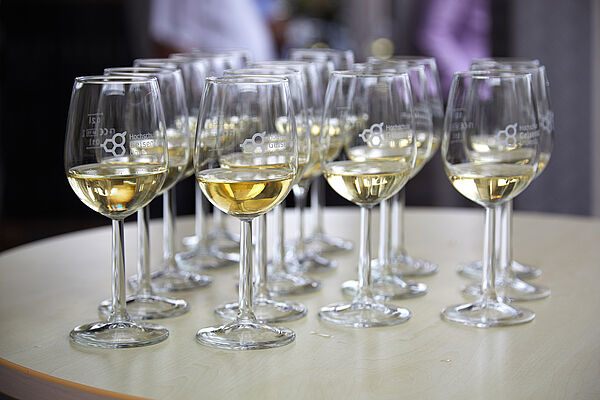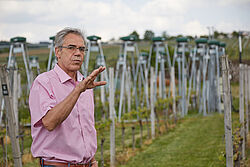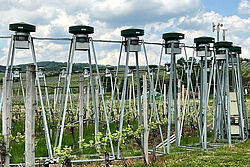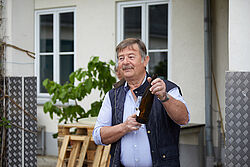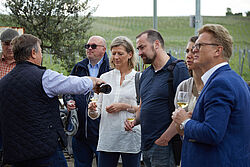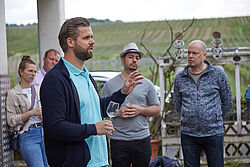At the 2022 International Riesling Symposium (IRS) held at Kloster Eberbach at the beginning of May, Prof. Dr. Hans Reiner Schultz, President of Hochschule Geisenheim University, discussed the effects of climate change on Riesling – in particular grape quality and taste – and how rising temperatures impact the work of winegrowers. In a lively debate with an international top-class audience, complemented by a tasting of Riesling wines dating back to 1966 which was commented by the famous British wine journalist Stuart Pigott, Schultz presented latest research findings and discussed them in the context of the sampled vintages: How climate conditions have changed over the past 50 years, how the shift in vegetation phases has required new vineyard management strategies, how increasing drought is causing a noticeable change in Riesling aromas, and how the temperature-induced drop in acidity levels requires professionals to come up with new winemaking approaches.
“These examples alone illustrate the enormous challenges the wine industry is already facing due to climate change and will continue to do so in the future,” explains Schultz. At the same time, there is a rising awareness among industry professionals to act more sustainably at all levels. As a teaching and research institution, we have a key role to play in this context, as we can transfer scientific findings from all disciplines related to viticulture and oenology into practice in our study programs and through knowledge transfer. The discussions as part of the IRS symposium have once again highlighted the great demand for such a transfer, both at a national and international level.”
About 160 Geisenheim students from the German and English B.Sc. Viticulture and Enology as well as Wine Business programs attended the symposium and took advantage of the rare chance to take part in discussions with renowned international winemakers, researchers, industry representatives, journalists and retailers. In addition, they had the chance to join four wine tastings which complemented the symposium. In addition to the wine tasting led by Prof. Dr. Hans Reiner Schutz who discussed the effects of climate change, the focus was on New World Riesling using the example of the Washington State region. The subject was presented by Prof. Dr. Markus Keller, Washington State University, and complemented by a thematic tasting. Further focus areas included the role of Riesling for wineries, retailers and the gastronomy sector as well as the making and marketing of Riesling with good aging characteristics. Altogether, the expert audience sampled around one hundred Rieslings from four continents and from almost six decades.
As a special treat, the international Riesling experts also sampled a 2015 Riesling “Krähennest” provided by Hochschule Geisenheim University’s campus winery. The “Krähennest” – an extraordinary vineyard site with 14 terraces near Rüdesheim – is home to 20 Riesling clones on six rootstocks. The vineyard is intended to cushion the effects of climatic “spikes” and is managed by Geisenheim students as part of a study project.
The agenda of the International Riesling Symposium also featured discussions about Riesling clones and grapevine breeding as key strategies to enable the wine industry to cope with climate change. At the Geisenheim Department of Grapevine Breeding, Prof. Dr. Joachim Schmid and Prof. Dr. Kai Voss-Fels provided detailed information on cutting-edge breeding research on the day before the symposium started.
"The guiding question of our research activities is: how can we help to make sure that winegrowers can continue to harvest healthy Riesling grapes in the future?" says Prof. Dr. Joachim Schmid. Future-proof Riesling clones, for example, would need smaller berries or loose berry clusters to make them less susceptible to Botrytis. Another aspect is vegetation behavior: to avoid the negative effects of late frosts, it is necessary to select clones that sprout later.
According to Schmidt, another aspect to keep in mind is that rising temperatures have a negative impact on the shelf life of Riesling wines. By sampling a Beerenauslese from 1990 as well as Rieslings from 1999, 2004 and 2021, the expert audience got a first impression of the changes in Riesling wines. As part of the wine tasting, they also sampled the world's most frequently cultivated Riesling clone Gm 239, which originates from Geisenheim breeding. By now, the department has registered 86 of the more than 1,200 selected Riesling clones with the German Plant Variety Office – a very pragmatic way of transferring the results of Geisenheim research into practice.
About the International Riesling Symposium
The International Riesling Symposium is the European part of a series of conferences which are held in Australia, the Washington State region (Riesling Rendezvous) and the Rheingau at an alternating basis. Partner of the Rheingau edition is Hochschule Geisenheim University, and thanks to the sponsoring provided by the wine trading company HAWESKO (Hanseatisches Wein und Sekt Kontor) Geisenheim students had the chance to attend the conference. Leading organizer of the two-day symposium was the VDP Rheingau e.V..

